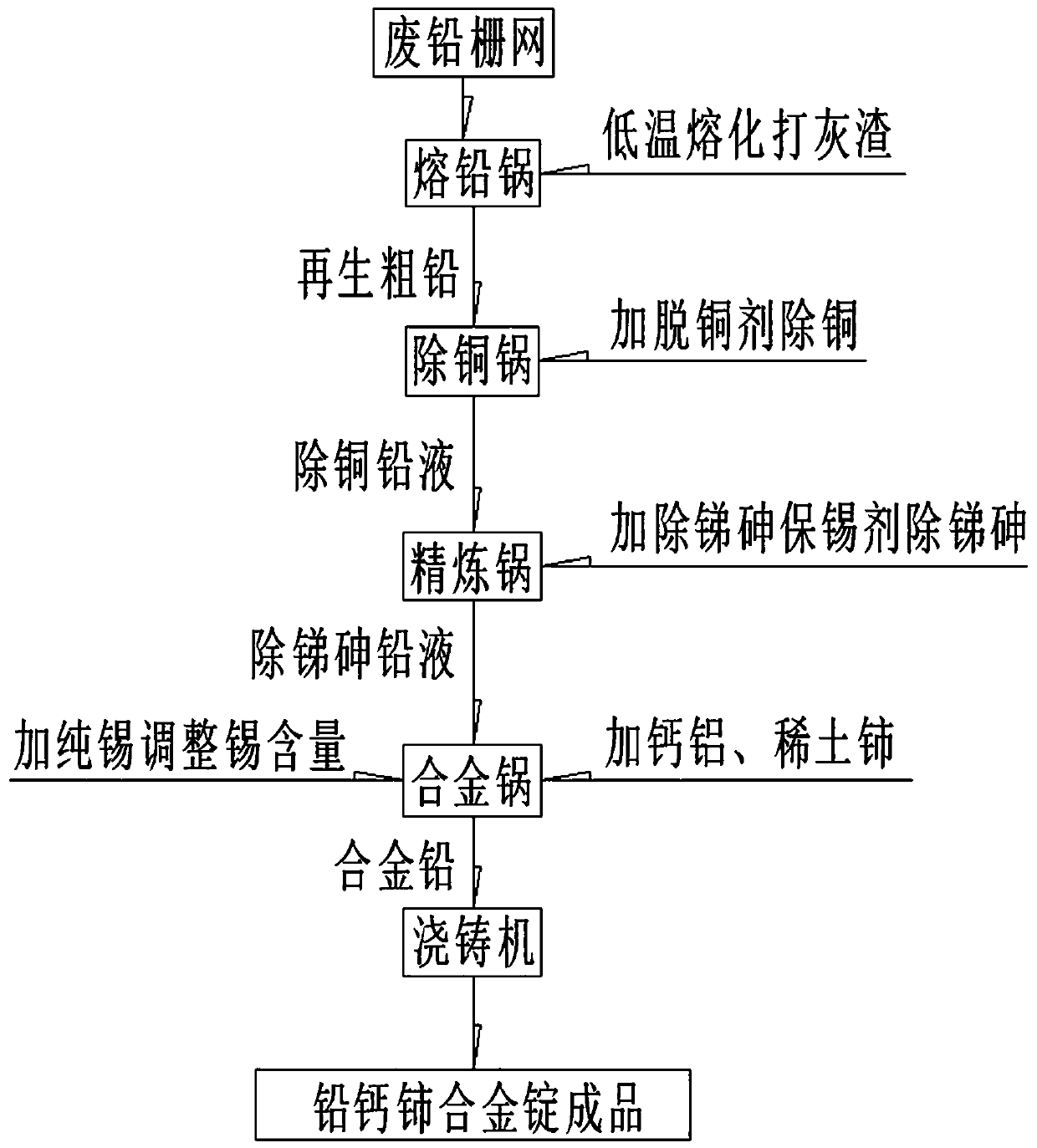Process method for producing lead-calcium-cerium alloy based on waste lead grid of waste lead-acid battery
The technology of a waste lead-acid battery and a process method is applied in the directions of lead-acid battery, battery recycling, waste collector recycling, etc., which can solve the problem of inability to use metal tin in waste lead grids, and achieves good reaction effect, simple operation, The effect of simple process
- Summary
- Abstract
- Description
- Claims
- Application Information
AI Technical Summary
Problems solved by technology
Method used
Image
Examples
Embodiment 1
[0037]Example 1: The waste lead grid is melted at 420±20°C in the melting pot, and the lead liquid is pumped into the copper removal pot with a lead pump after the ash is removed, and the sampling spectrum is analyzed. The composition: Sb 0.102%, As 0.0071%, Sn 0.51 %, Cu 0.013%, Bi 0.0038%, Ag0.00068%, Pb balance; heating up to 530±20°C, adding pyrite powder to remove copper, sampling direct reading spectral analysis, the composition is as follows: Sb 0.100%, As 0.0068 %, Sn 0.505%, Cu 0.0005%, Bi 0.0038%, Ag 0.00069%, Pb balance.
[0038] After the ash and slag are crushed, the copper and lead liquid is pumped into the refining pot with a lead pump.
[0039] Raise the temperature of the copper and lead removal solution in the refining pot to 560±20°C, calculate the amount of antimony, arsenic and tin retention agent used as 1.3 times the total amount of antimony and arsenic, turn on the mixer, stir the lead solution to generate a vortex, and the input speed should not affect...
Embodiment 2
[0042] Example 2: The waste lead grid is melted at 380±20°C in the melting pot, and the lead liquid is pumped into the copper removal pot with a lead pump after the ash is removed, and the sampling spectrum is analyzed. The composition: Sb 0.08%, As 0.007%, Sn 0.67 %, Cu 0.011%, Bi 0.004%, Ag0.00071%, Pb balance; cool down to 355±20°C, add red phosphorus to remove copper, sample direct reading spectrum analysis, the composition is as follows: Sb0.081%, As 0.0071%, Sn 0.655%, Cu 0.0003%, Bi 0.004%, Ag 0.00070%, Pb balance.
[0043] After the ash and slag are crushed, the copper and lead liquid is pumped into the refining pot with a lead pump.
[0044] Raise the temperature of the copper and lead removal solution in the refining pot to 570±20°C, calculate the amount of antimony, arsenic and tin retention agent used as 1.3 times the total amount of antimony and arsenic, turn on the mixer, stir the lead solution to produce a vortex, and the input speed should not affect the vortex...
Embodiment 3
[0047] Example 3: The waste lead grid is melted at 480±20°C in the melting pot, and the lead liquid is pumped into the copper removal pot with a lead pump after the ash is removed, and the sampling spectrum is analyzed. The composition: Sb 0.012%, As 0.0091%, Sn 0.39 %, Cu 0.009%, Bi 0.0035%, Ag0.00078%, Pb balance; heating to 490±20°C, adding a mixture of sulfur and pyrite powder to remove copper, the weight percentage: sulfur 15%, pyrite 85%, sampling direct reading spectroscopic analysis, the composition is as follows: Sb 0.011%, As 0.0091%, Sn 0.375%, Cu 0.00049%, Bi 0.0035%, Ag 0.00079%, Pb balance.
[0048] After the ash and slag are crushed, the copper and lead liquid is pumped into the refining pot with a lead pump.
[0049] Raise the temperature of the copper and lead removal solution in the refining pot to 560±20°C, calculate the amount of antimony, arsenic and tin retention agent used as 1.3 times the total amount of antimony and arsenic, turn on the mixer, stir the...
PUM
 Login to View More
Login to View More Abstract
Description
Claims
Application Information
 Login to View More
Login to View More - R&D
- Intellectual Property
- Life Sciences
- Materials
- Tech Scout
- Unparalleled Data Quality
- Higher Quality Content
- 60% Fewer Hallucinations
Browse by: Latest US Patents, China's latest patents, Technical Efficacy Thesaurus, Application Domain, Technology Topic, Popular Technical Reports.
© 2025 PatSnap. All rights reserved.Legal|Privacy policy|Modern Slavery Act Transparency Statement|Sitemap|About US| Contact US: help@patsnap.com

